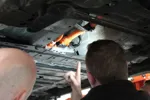Even after his success in TV, his goal to own a farm was still out of reach.
He said: “I knew I would have to start my own business to ever be able to afford to buy a farm.
“I only had enough money to set up my own food and drink marketing agency and pay my mortgage for three months, but I believed it would work.
“I had no clients, but again I believed in my father’s two principles and I got people’s business.
“I realised I’m a maverick and I knew I wouldn’t be able to work with box ticking corporates.
I needed to find the underdogs and products that were trying to challenge convention and the mainstream.
I started to work with start-ups and businesses trying to punch above their weight.”
This led to campaigns with Lloyd Grossman sauces, Kettle Chips and Plymouth Gin.
He said: “Are you honest about who you are? Your business should have the culture of you and I’ve often found the failings you find in your business usually reflect your own.”
It was the marketing business that gave him the funds to acquire a farm on the Devon and Cornwall border. It took 30 years from that moment in his father’s Birmingham allotment.
After acquiring the farm he created his own brand, The Black Farmer. It launched in 2004 with the “most premium sausage on the market” priced within reach of all consumers.
The point of difference for the brand was its gluten free recipe.
He said: “I spent a lot of time investing in the audience by going on roadshows taking the product to the people and they actually became my infantry troops when it came to battling the supermarket giants to get my products on the shelf.”
Emmanuel-Jones also started a youth initiative to help deprived children in urban neighbourhoods.
The idea would take black teenagers from the inner city and put them in a country environment on his farm.
The Young City Farmers initiative gave a big launch for the brand and spurred a documentary on Channel 4 in 2005 which saw its potential to generate good television.
He said: “Most businesses see customers as a pain in the arse, but they became my salesmen.
“You have to ask yourself, do you truly love your customers? We have a simple policy – if there’s a customer complaint we will always go over the top in how we address it.
“We still go to shows and if someone doesn’t have the money to buy some of my products I just give it to them and ask them to send me the money.
"It makes them feel wonderful and even if they don’t send you the money, I write off the cost as part of the marketing budget because that person is guaranteed to tell a lot of people.”
Emmanuel-Jones got his own customers to sign a petition to the supermarkets urging them to stock his products and eventually it worked.
The Black Farmer is now stocked in all major supermarkets.
Focus on marketing
After successfully establishing the brand, Emmanuel-Jones left production and distribution to third parties to allow him to focus on his own skill set – marketing.
He said: “Everyone called me the black farmer when I first started in Devon and the name has some jeopardy behind it.
Every good story, film or book has some jeopardy behind it and that’s what you need to market a brand, it’s the special ingredient you’re looking for.”
The Black Farmer brand has a constant relationship with the cust-omer which is driven by its website and social media presence.
Emmanuel-Jones said: “There’s a big backlash away from big corporate companies and people want to see the face behind the brand.
“In terms of the automotive industry, I think dealers can allow the car to become a barrier. I’m not selling someone sausages; I’m selling an experience, culture, myself and what I believe in.”
The Black Farmer doesn’t use traditional advertising. All the spend goes on “below the line” activity on social networks and word of mouth.
His final message for dealers: “Make sure you do things you’re passionate about. I love business and it’s a great time to start one.
"I started mine in the recession and there are great opportunities out there.
“It’s always outsiders that bring about change and businesses need to ask themselves, are they enough of an outsider?”
















Login to comment
Comments
No comments have been made yet.